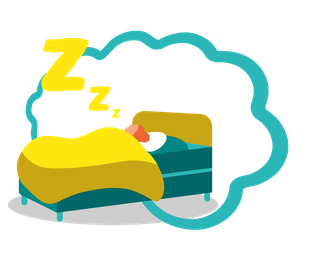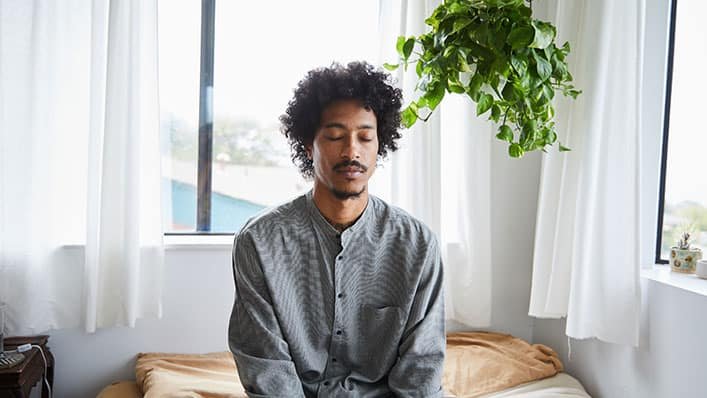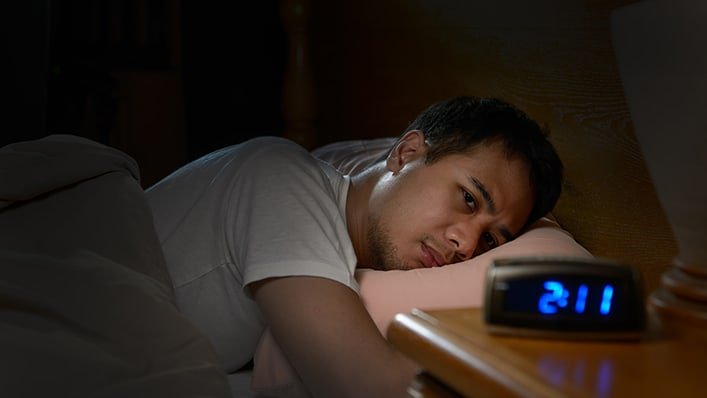How can meditation help with sleep?
Meditation is a practice that can help prepare our bodies and minds for a restful night's sleep. It can help us to fall asleep faster, sleep longer and even deeper. You may have heard it being referred to as 'sleep meditation'.
Meditation exercises can enable us to relax, unwind and let go of thoughts or worries from the day.
Practicing meditation has many calming effects on the body. It helps encourage slower breathing and lowers our heart rates, all of which can help with drifting off to sleep.
It may take practice to master the art of relaxing and letting the mind be at peace. Try these easy ways to get started.
Meditation techniques to help you sleep
There are lots of different meditation techniques that may help with sleep. Meditation may involve gently noticing a repeated phrase, a visual image, a sound, or a sensation, such as breathing, which can help focus the mind and relax the body.
When using sleep meditation audio tracks on a smartphone before bed, make sure to dim or turn off the screen.
1. Guided meditation
Guided meditation is a great place to start for those who are new to this type of practice. It simply means listening to someone and following their suggestions as you meditate.
Try our Beditation guided relaxation video.
Video: Beditation
When you're ready to sleep listen to this audio-only video to help you to relax.

2. Simple breathing technique
This 4-7-8 breathing technique is repetitive in nature. The counting sequence gently focuses the mind on the breath, which can help ease worries or other troubling thoughts.
Get comfortable in bed and then follow these steps:
- Inhale through your nose for 4 seconds.
- Hold your breath for 7 seconds.
- Exhale through your mouth for 8 seconds.
- Repeat this 4 times.
3. Progressive muscle relaxation
Practicing muscle contraction and relaxation can help us become more aware of when we're relaxed, and when we're tense.
Try this muscle relaxation technique before bed to release any tension that has built up from the day.
Don't worry if it takes time to learn, it's like any other skill that takes time to get right.
Video: Progressive muscle relaxation
This audio-only video will guide you through an exercise to help you relax your body and mind.
Does meditation help with anxiety?
Anxiety is a normal emotion that we all experience. However, anxiety at bed time is often connected to sleeping problems.
When we settle down in bed our minds can race, and worrying makes it harder to fall asleep and stay asleep throughout the night.
Meditation can help change your relationship with anxious thoughts, encouraging you to notice them and let them go rather than acting on them.
However, if you have persistent anxiety, cognitive behavioural therapy (CBT) is a recommended treatment that might help. If you are experiencing anxiety or depression, you can refer yourself to an NHS talking therapies service.
Does meditation help reduce stress?
Stress is the body's reaction to feeling threatened or under pressure. Meditation techniques help promote a more relaxed response to our stressful thoughts and feelings.
When we are stressed, our body's sympathetic nervous system goes into overdrive and releases a hormone called adrenaline (often called the "fight or flight" hormone), which usually gives us a boost or motivates us to act quickly.
Meditation can help to calm down the sympathetic nervous system by turning on the parasympathetic nervous system. This works to counteract the feelings of stress and helps us to feel relaxed.

Get sleep tips sent to your inbox
Your sleep matters, so put sleep first by joining our 6-week email programme. From creating your perfect sleep sanctuary to setting a wind-down alarm, join today to find out how to make "goodnight" a great night.
How effective is guided sleep meditation?
Evidence suggests that regular practice of guided sleep meditation may improve sleep quality.
Meditation is most likely to help aid a restful night's sleep if used alongside other healthy sleep habits, such as:
- going to bed and getting up at the same time every day
- keeping your sleep environment cool, dark and quiet
- reducing caffeine intake
- avoiding the use of digital screens in your bedroom
If you are experiencing symptoms of depression or persistent anxiety such as excessive worrying, post traumatic stress disorder, social anxiety or symptoms of obsessive compulsive disorder (OCD), you can refer yourself to an NHS talking therapies service. The service provides talking therapies, cognitive behavioural therapy (CBT) and counselling to provide help and support with mental health problems.


